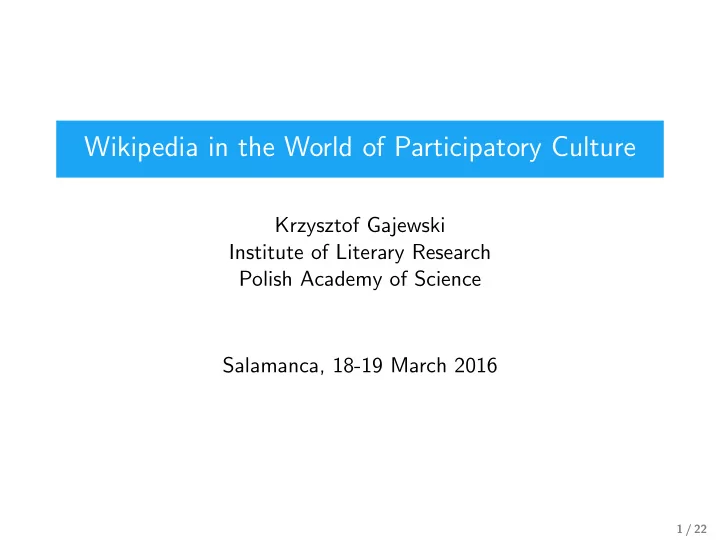

Wikipedia in the World of Participatory Culture Krzysztof Gajewski Institute of Literary Research Polish Academy of Science Salamanca, 18-19 March 2016 1 / 22
Table of Contents Fundamental Concepts and Definitions Participatory culture Many Faces of Collective Action Wikipedia Wikinomics 2 / 22
Fundamental Concepts and Definitions 3 / 22
The Kula Ring soulava — necklace of red shell, mwali — bracelet of white shell 1 1 Bronislaw Malinowski, Argonauts of the Western Pacific: An Account of Native Enterprise and Adventure in the Archipelagos of Melanesian New Guinea, London 1922. 4 / 22
The Kula Ring 5 / 22
Gift economy • gift economy — barter economy — market economy • gift economy: hitch-hiking, open source software, Wikipedia, CouchSurfing, BookCrossing (but not BookSwapping), Napster, torrent, etc. 6 / 22
Participatory culture 7 / 22
Participatory culture For the moment, let’s define participatory culture as one: 1. With relatively low barriers to artistic expression and civic engagement 2. With strong support for creating and sharing one’s creations with others 3. With some type of informal mentorship whereby what is known by the most experienced is passed along to novices 4. Where members believe that their contributions matter 5. Where members feel some degree of social connection with one another (at the least they care what other people think about what they have created). 2 2 Henry Jenkins, Confronting the Challenges of Participatory Culture: Media Education for the 21st Century (Part One) , http: //henryjenkins.org/2006/10/confronting_the_challenges_of.html 8 / 22
Participatory culture • Participatory culture vs. consumer culture • Consumer → prosumer vel produser (A. Toffler) • Participatory culture: Web 2.0, blogs, mediawiki, Wikipedia, social networks, Flickr, Second Life, YouTube, Facebook, Twitter, LinkedIn, Instagram, chan culture, carpooling, free accomodation, social bookmarking, folksonomy, crowdsourcing, crowdfunding, social banking, social dictionaries, tandem learning, language exchange, Okcupid, Tinder, Airbnb, Uber, etc. 9 / 22
Critics of Participatory Culture • Web 2.0 = new marxism ”Every free listing on Craigslist means one less paid listing in a local newspaper. Every visit to Wikipedia’s free information hive means one less customer for a professionally researched and edited encyclopedia such as Britannica.” 3 • most of us has no choice: Wikipedia use in Africa 4 3 Andrew Keen, The Cult of the Amateur: How Today’s Internet Is Killing Our Culture 2007. 4 The Truth According to Wikipedia, 2008, directed by IJsbrand van Veelen 10 / 22
Many Faces of Collective Action 11 / 22
Crowdsourcing • National Health Museum in Washington: photo of sick people: professional photography - 100$ — iStockPhoto - 1$ 5 5 Jeff Howe, The Rise of Crowdsourcing, ,,Wired” 2006 http://www.wired.com/wired/archive/14.06/crowds.html 12 / 22
Wisdom of Crowds Galton’s experiment: a weight-juging competition • 787 guesses, average answer 1,197 pounds • Actual weight — 1,198 pounds 6 6 James Surowiecki, The Wisdom of Crowds: Why the Many Are Smarter Than the Few and How Collective Wisdom Shapes Business, Economies, Societies and Nations, 2004. 13 / 22
Wikipedia 14 / 22
Five Pillars of Wikipedia 1. Wikipedia is an encyclopedia 2. Wikipedia is written from a neutral point of view 3. Wikipedia is free content that anyone can use, edit, and distribute 4. Editors should treat each other with respect and civility 5. Wikipedia has no firm rules 7 7 https://en.wikipedia.org/wiki/Wikipedia:Five_pillars 15 / 22
Wikipedia as an Organization and its Structure (Jemielniak) A conflict is one of the main reasons of online cooperation 8 8 Dariusz Jemielniak, Common Knowledge? An Ethnography of Wikipedia 16 / 22
Size of English Wikipedia (without images) Wikipedia in print (as of March 2016) • 2259 volumes of Britannica size • 12 stacks • 3,009 million words • 5.1 million articles • an average of 590 words per article 17 / 22
The Problem of Content Reliability ”The content was rated by experts according to the following criteria: accuracy, up-to-dateness, breadth of coverage, referencing and readability.(...) Across all topics, Wikipedia was the most highly rated in all domains except readability.” 9 9 Reavley, N. J.; MacKinnon, A. J.; Morgan, A. J.; Alvarez-Jimenez, M.; Hetrick, S. E.; Killackey, E.; Nelson, B.; Purcell, R.; Yap, M. B. H.; Jorm, A. F. (2011). ”Quality of information sources about mental disorders: A comparison of Wikipedia with centrally controlled web and printed sources”. Psychological Medicine 42 (8): 1. 18 / 22
Who is the Author? • Jimbo Wales in Stanford: ” the most active 2%, which is 1400 people, have done 73.4% of all the edits.”” • Alan Alda article: ”few of the contributors (2 out of the top 10) are even registered and most (6 out of the top 10) have made less than 25 edits to the entire site. In fact, #9 has made exactly one edit — this one!” 10 10 A. Swartz, Who writes wikipedia, 2006 http://www.aaronsw.com/weblog/whowriteswikipedia 19 / 22
Wikinomics 20 / 22
Principles of Wikinomics 1. Openness • open standards (Apache, Linux, MySQL, Firefox) • financial transparency • education: MIT OpenCourseWare 2. Peering • hierarchical model: the church, the military, the government • meritocratic, peer-to-peer model • Linux, • Cambia (Biological Open Source) vs. Monsanto 3. Sharing — defeat of Digital Rights Management (DVD), public human genome project, Skype 4. Acting globally — Boeing has partners from 6 countries 11 11 Don Tapscott, Anthony D. Williams, Wikinomics: How Mass Collaboration Changes Everything, 2006. 21 / 22
Key notions of Wikinomics • Ideagoras —professionals freelancer, global markets of ideas (www.innocentive.com), Q&A • Prosumers, prosumption — user generated content (Second Life partly opens its code, Apple refuses) • New Alexandrians — to collect all the human knowledge • Platforms for Participation — open API (Amazon, eBay, Google) • Global Plant Floor — General Motors and outsourcing • Wiki Workplace — Battlefield 2 as a way of communication 12 12 Don Tapscott, Anthony D. Williams, Wikinomics: How Mass Collaboration Changes Everything, 2006. 22 / 22
Recommend
More recommend